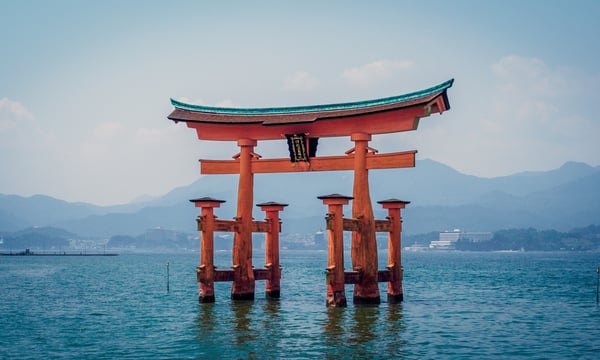Due to work and the pandemic, I spent a year in Tokyo.
Even though I couldn't fully grasp firsthand information from the media due to language barriers and only stayed for a year, being in Japan every day has its value in authenticity. I'd like to share some observations and feelings, albeit from a not very rigorous perspective. This article overlooks many metrics available from public sources, and any superficial viewpoints should primarily be attributed to my limited personal insights.
Environment
There are many factors that affect livability, but I'll just talk about a few that I find important. Having lived in China's first-tier cities like Beijing, Shanghai, Guangzhou, and Shenzhen, I'll compare Tokyo with these cities.
Air Quality: Shenzhen ≈ Tokyo ≈ Guangzhou > Shanghai >>> Beijing
You can check specific pollution data on waqi.info. Here's my subjective experience: My rhinitis started while living in Beijing, was less severe in Guangzhou and Shenzhen, flared up twice a year in Shanghai, and also twice a year in Tokyo but with milder symptoms. Moreover, each visit to Beijing would result in nosebleeds, making for a terrible experience.
Vegetation and Greenery: Guangzhou > Shenzhen > Shanghai > Tokyo > Beijing
Public data might seem odd, so let's stick to subjective feelings.
- My first visit to Guangzhou was shocking; I never knew overpasses could host plants... truly deserving of its nickname "The City of Flowers."
- Shenzhen's greenery, like around the Overseas Chinese Town area, felt fantastic, a place I liked.
- Shanghai felt worse than Shenzhen, just mediocre, but still better than Beijing and Tokyo.
- Tokyo's greenery depends on the area. Wealthier districts and newly developed areas tend to have better greenery, as affluent residents seem to enjoy cultivating their own plants, and public greenery in these areas is quite good, similar to Shanghai. But overall, it feels like there's not much green space.
- Beijing's green coverage seems high, but those areas aren't places you'd visit daily: Xiangshan, golf courses, etc., so my impression is that Beijing always seems dusty, scorchingly hot in summer, and very cold in winter, which I find perplexing.
Natural Disasters: Shanghai > Beijing > Shenzhen > Guangzhou >>> Tokyo
- Shanghai's potential geological disasters are mostly limited to typhoons, which are generally weak.
- Shenzhen and Guangzhou both experience typhoons, severe enough at times to halt work and school; Shenzhen's drainage system is much better than Guangzhou's when it comes to flooding during typhoons.
- Beijing doesn't have these issues but is on a seismic belt. Additionally, it suffers from smog and sandstorms (not sure if still common);
- Tokyo faces annual typhoons and monthly earthquakes, with potential tsunamis from shallow sea earthquakes, and Mount Fuji, an active volcano, is about 150 kilometers from Tokyo.
However, considering Japan's seismic-resistant construction, unless there's a direct hit from an earthquake above magnitude 7, there shouldn't be significant impacts. Remember, during the 2011 earthquake, less than 1,000 people were directly buried or died due to the quake. But since you're in Japan, it's crucial to be prepared for disasters and have some level of acceptance.
Work
Almost every multinational company has a branch in Tokyo, especially in the IT sector, and they offer good compensation. For instance, Google's Tokyo office reportedly offers higher salaries than its Swiss counterpart, though salaries in Switzerland are already high.
To work in Japan, you need to apply for a Certificate of Eligibility, with necessary documents available at the Japanese embassy. Typically, besides the employment contract from a Japanese company, you might need to prepare a CV. Japan seems to favor applicants with backgrounds in large corporations, but don't fabricate your resume.
The stereotype of Japanese companies being stagnant is something I haven't experienced, so I can't comment. However, from conversations with friends, it seems not too bad, at least in terms of not asking women about their marital or childbearing plans during interviews.
Another stereotype is Japan as a country of overwork. Well, Japan's overtime culture is nowhere near China's 996 work schedule.
Note: We are hiring, so keep an eye out for our job listings at the end.
Living
Language
Though often mocked for their English accent, many people in Tokyo, including some older individuals, understand some English, making it possible to enjoy dining and entertainment without knowing Japanese.
Since Japanese uses Kanji (Chinese characters), Chinese people, despite not knowing Japanese, can
guess the meanings of some words. A funny incident involved a Japanese company shipping goods to China, where the Japanese manager specifically instructed not to use old newspapers as packing material because Chinese people could understand the characters, and some reports could have a negative impact.
However, for long-term residence, learning Japanese is more convenient. Otherwise, it can be quite troublesome for both yourself and others.
Learning basic Japanese seems easier than English (🤔not sure), as many words share similar origins and pronunciations.
Food and Drink
Tokyo has the most Michelin-starred restaurants in the world. If you want to eat well, Tokyo is the place. Even the best French cuisine is available in Tokyo.
For everyday meals, seafood, meat, eggs, and dairy are affordable, while vegetables and fruits are relatively expensive. The internet exaggerates the price of luxury fruits, but it's not as outrageous as claimed. A watermelon might cost around 50+ RMB, expensive but not unaffordable.
In general, industrially produced food products are cheap, while non-industrial products are expensive. For example, Haagen-Dazs is less than half the price in China, while locally grown fruits and vegetables are more expensive.
Entertainment
As a cultural hub in Asia, Tokyo offers a wide range of entertainment options... but as someone with little interest in such activities, I don't have much to say on this topic.
Culture
Tokyo is a city with a very high number of foreigners, making it culturally inclusive. Just be a good person, and you'll be fine.
Digitalization
Despite complaints about Japan's lag in digitalization and the "lost two decades" without the internet, Japan's digital infrastructure is actually quite good when not compared to China and the US. After all, if China and the US are the benchmarks for the internet, then other countries wouldn't have the internet at all.
Electronic payments similar to WeChat Pay and Alipay have become widespread; convenience stores can handle administrative documents; some new government websites, like Tokyo's COVID-19 updates, are well-designed. Considering the number of foreigners in Tokyo, many electronic systems support English, Chinese, and Korean, which is very friendly.
Plus, you can access the internet directly in Japan, a significant advantage for professionals.
Human Services
As a developed country, Japan's service costs, including delivery, moving, trash disposal, and domestic help, are much higher than in China, roughly 2-4 times more expensive (🤔not sure).
Public Safety
From my experience, Tokyo's public safety is excellent, almost achieving the traditional Chinese societal values of "doors unlatched at night and roads unclaimed by day."
More than one colleague has lost their wallet, only to be called to retrieve it, with nothing missing. Another colleague once left his briefcase on the street, and it remained untouched for half a day.
The Yahoo disaster prevention app not only reports natural disasters like earthquakes but also sends crime notices from the police, which, from a Chinese perspective, often seem like "trivial matters," such as phone scams. I've never received scam or telemarketing calls in Tokyo.
Government and bank service counters don't have bulletproof glass or document pass-through windows, just a desk. Government halls don't have security guards; there was a proposal to hire some, but residents opposed it as a waste of money and it was not implemented.
Administration
I've dealt with local government a few times and encountered staff dedicated to assisting foreigners, with excellent service attitudes.
In addition to government workers, there are many volunteers from the local community. Residents seem to view their local administrative offices as their own, reflecting a very people-oriented, socialist approach.
Miscellaneous
One aspect I particularly appreciate about Tokyo, similar to Shanghai, is the abundance of convenience stores and logical road planning. This is worth mentioning because, in Beijing, finding a convenience store can be a challenge, and even when you do, it might be across the street. Crossing the street could require walking half a kilometer, which is very discouraging.
Spending
Education
I don't know much about this, but a Japanese friend mentioned that $1 million can cover nearly the top-tier education expenses for a child in Tokyo. Compared to the comprehensive education costs in China's first-tier cities, it's not expensive.
Healthcare
Japan's healthcare is of high quality, and the national health insurance covers a wide range. Foreigners working in Japan can also enjoy Japanese health insurance. The coverage rate is generally above 70%. Medications within the insurance coverage and the range of services are better than in China, where herbal medicines are often prescribed, and special drugs are not covered.
My only experience with medical treatment and check-ups in Japan was extremely positive.
Commuting
In
Tokyo, commuting by train (including subway, rail transit, etc.) is very common. For example, traveling from my residence to my company costs a few hundred yen. Trains are very crowded during peak hours, but I usually don't take the train to work, so I haven't experienced it (and don't want to).
Taxis are expensive. If there are no trains at night and you live far away, staying in a hotel might be cheaper than taking a taxi home.
Cars
Due to the absence of import tariffs, both new and used cars are very affordable, especially luxury cars, possibly half the price compared to China. Parking might be expensive, but if you live in a detached house, you might have your own parking space.
Housing
Housing is separated from other expenses because it's a major cost for Chinese people. For a detailed comparison, you can read the article "How Expensive Are Houses in China? A Direct Comparison with Foreign Cities Is Necessary".
In summary, although Tokyo's housing prices are the highest in Japan, the unit price for houses of the same quality is cheaper than in Beijing and Shanghai. From my limited understanding, there are a few aspects worth mentioning from a non-data perspective:
Property Taxes
Japan has privatized land, so there are property taxes. Owning real estate in Japan requires paying "Fixed Asset Tax" and "City Planning Tax," with rates at 1.4% and 0.3% respectively, though the calculation can be complicated.
For example, a property with 150 square meters of land and 100 square meters of house valued at 51 million yen (approximately 3.1 million RMB) would have taxes amounting to 182,250 yen (about 11,092 RMB).
Gift Tax
When considering inheritance, there's a gift tax to be paid. For a property valued at 51 million yen, the gift tax, calculated under "special property for gift use," would be 2.104 million yen (approximately 128,000 RMB), which is quite expensive. But don't rush; by the time we're old, China might also have estate or inheritance taxes.
Note: These tax calculations are my own and might contain errors. They are for reference only.
Mortgage Rates
For those with permanent residency in Japan (aka green card) or long-term workers, Japanese mortgage rates are quite low, ranging from 0.4% to 1%. You can estimate mortgage payments using the SMBC mortgage calculator. Compared to China's 4%+ rates, it's almost a giveaway.
No Public Area Calculation
In China, the public area ratio can be quite large, up to 30%, effectively making it a 10%-30% surcharge on buying a house. Japan doesn't have this calculation method, so buying a 100 square meter house means you get 100 square meters of living space.






